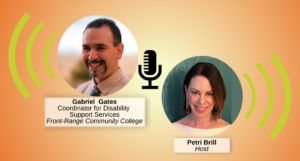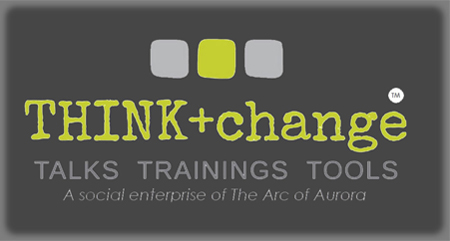 As the world becomes more digital by the day, access to communities and resources expands—but only for those with the technology to reach them. Without internet access, many find themselves isolated from essential services. Digital equity ensures that everyone, including people with disabilities, can fully engage with digital content.
As the world becomes more digital by the day, access to communities and resources expands—but only for those with the technology to reach them. Without internet access, many find themselves isolated from essential services. Digital equity ensures that everyone, including people with disabilities, can fully engage with digital content.
Gabriel Gates understands that true accessibility goes beyond just meeting minimum standards. As the academic coordinator for disability services at Front Range Community College and a policy advocate in Colorado, Gabe shares invaluable insights on this month’s THINK+change podcast.
Discussed in this episode
- Equity vs Accessibility;
- Common barriers;
- How digital needs change over time;
- New technology and the future of equity;
- Policy shaping; and
- How you can participate in advocacy.
Learn more by watching a vodcast (video) or listening to podcast (audio) episode 85.
Gabriel Gates: Coordinator of Disability Support Services at Front Range Community College – Westminster
Timestamps:
- 1:50 – About Gabe
- 3:50 – Digital Equity vs Accessibility
- 7:30 – Barriers to Digital Equity
- 10:00 – How digital needs change over time
- 11:20 – New technology to help equity
- 13:25 – Government policy shaping digital equity
- 17:00 – How businesses can provide digital equity
- 21:00 – Opportunities to advance digital equity
- 24:55 – Continuing advocacy: Engage, Equip, Empower
Resources mentioned in this episode: Digital Accessibility Workshop from the Colorado Governor’s Office of Information Technology
Additional response from Gabe at 21:00: “This powerful, billion dollar question deserves a powerful response. While I know that digital equity is going to take lots of effort and great work, I believe that the best approach starts with compassion. i’m talking about a authentic and genuine care for people and society. it’s also going to take devotion, a strong commitment to engaging in discussions with people from all walks of life, cultures and backgrounds. I am speaking about community organizing at its finest to gather experiences and perspectives from Coloradans. we can have expert web designers and developers create optical digital content but that alone won’t complete the charge set before us. We could also provide the latest and greatest assistive technologies, yes, even use AI, but that still won’t achieve the mission. if there’s one thing I’ve learned from working in education as a disability services professional, it’s that students don’t care about how much I know, they want to know that I care. moving forward with fostering and sustaining digital equity requires listening two people who are most affected by digital content. We need to do everything we can to amplify the voices of the Disability community. As the motto goes, ‘nothing about us, without us.’”
This work is made possible through support from Dungarvin, arc Thrift Stores, Developmental Pathways, and The Arc of Aurora.
